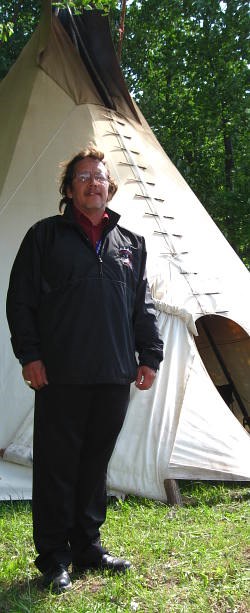Ontario has had some forthright and well-meaning ministers of aboriginal affairs, says Association of Iroquois and Allied Indians Grand Chief Randall Phillips.
But the province has got to make some changes in its bureaucratic staff for there to be any real progress in First Nation relations, the grand chief told SooToday.com during this week's All Ontario Chiefs Council meeting at Rankin Arena.
"The best way to get rid of a minister if you don't agree with his or her stance is to not do what he or she wants," Phillips said. "It will be a reflection back when people say we can't get anything done in this ministry."
Phillips says Ontario needs a minister of aboriginal affairs who's strong and resilient, like the First Nations people living in Ontario.
Maybe then, there will be some real progress toward badly needed resource revenue-sharing agreements.
"The province would like to think that it's doing all of the good motions to have better relations with First Nations," he said. "The optics are there but the reality is that we have a bureaucracy that has existed for hundreds of years."
Ministers come and go frequently, Phillips said, but the bureaucrats who write the reports and make recommendations to the minister have been there a long time.
"There's its own corporate culture within these bureaucracies," he said. "Politicians come and go but the bureaucrats stay forever and it's those bureaucrats that, in their own minds, are doing the right things for First Nations people."
He said that the bureaucrats are the ones who actually decide what communities will get in terms of programs, funding, services and support.
"Those things are completely outside of the public realm but as political leaders we do see them," Phillips said.
Meanwhile, many years of little progress only proves that First Nations people are still resilient, but that's because their issues have not been dealt with.
"I've been involved in the issues for over 25 years and I've seen little or no resolution to any of them," Phillips said. "We're still talking about education, lack of funding, health care and those things, because none of those things have ever changed."
He said that it's vital to get these fundamental issues resolved for First Nations to move forward and flourish.
One thing Phillips says he's happy to see are more dynamic, articulate leaders like Chief Dean Sayers of Batchewana First Nation.
"He's a good orator and he's well read in terms of his history, well read even in terms of the politics of the day," said Phillips. "You bring Dean to the table and right away you know you're talking to somebody with substance."
Partly because of this leadership, Batchewana is becoming an example to other member bands in the Association of Iroquois and Allied Indians.
"What I've found over the last few years is a decided change with respect to it's recognition of treaty and aboriginal rights," he said. "It is, in a sense, very refreshing and it's something that I can support. Batchewana has brought that voice back to us to say, 'Hey, we're treaty people!' We belong to a bigger and better thing."
Phillips said Batchewana First Nation is forging mutually beneficial relationships directly with businesses and the community's neighbours to move Batchewana forward economically and socially.
These direct relationships bypass provincial and federal government agencies that tend to move slowly and don't appear to be very in touch with the communities they are supposed to serve.
Batchewana and other Ontario First Nations communities are also cultivating better relations with their neighbour municipalities, said Phillips.
"Some of our communities have very good relations with their local municipalities, others have worked on it and strived for it, and with others there hasn't ever been one and probably never will be one," he said. "Partly, I think, that the municipalities have always maintained, like a lot of people, that the First Nations or Indians are part of the federal government's responsibility and they don't have to do anything for them, end of story."
But Phillips said more and more civic leaders are realizing there is a place for First Nation people in their local economy and in some of the decisions they make that affect their regions.
He also said that a strong-enough political will can make the positive changes needed to improve relations with First Nations, the province, municipalities and business interests.
"When government wants to, it can enact legislation and or regulations in the course of a day or two," he said. "It comes down to political will in terms of changing things, political will in terms of making sure the bureaucrats do what they're instructed to do."
Phillips said there's an effort needed by all parties to make sure First Nation issues stay on the table and are given priority by all levels of government and business.
By working together, Phillips says changes that are beneficial for everyone can happen faster and more smoothly than they would without a true spirit of cooperation.
